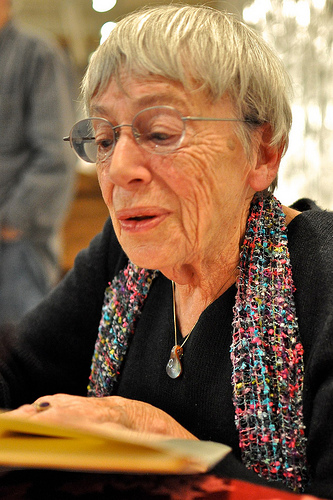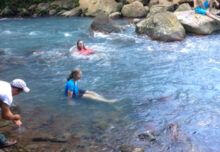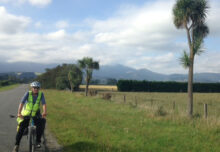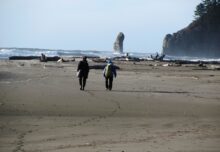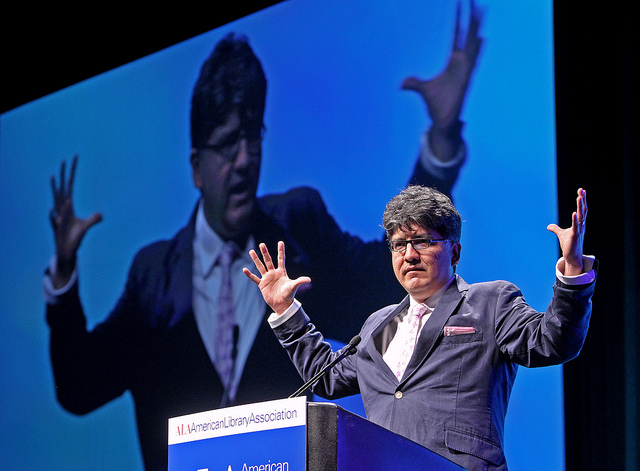
Cherry blossoms! The pruned tree leaned toward the sidewalk and I took a big gulp of the sweet perfume of the flowers. Every morning before going downtown I meandered the streets near my friends’ house in Lake City, looking at houses built on steep hills, houses with backyards that bordered on a merrily running creek and my favorite—a sophisticated skinny house built on and behind a garage on a long skinny lot. I told my friend Dave about the garage house but he wasn’t pleased. “I know the place,” he said. “It’s a problem in Seattle, splitting up house lots.”
He explained that in rapidly growing Seattle space is at a premium and garage houses are a not-quite-legal way to get more dwellings in a neighborhood. Another thing to do is to tear down a small but adequate house and put up a huge house, or apartment building, that fills the whole lot. I didn’t say it, but I still liked the garage house.
Dave and Jen were visiting a friend south of downtown so they gave me a ride to Cyclops, a slightly run down café and bar, where I met Ginnie Zech, a friend who I met at the Colgate Writing Conference and who is now getting an MFA at the University of Montana in Missoula. Of the over twelve thousand attendees at the AWP conference perhaps half of them were MFA students.
When Ginnie arrived she needed coffee immediately. She’d gone to a poetry reading the night before that started late and was prefaced with hours of drinking. We hadn’t been to any of the same events so we filled each other in on what we’d been doing at the conference. She admitted that the huge crowds at the convention center had kept her away and she’d been going to “off campus” events in other parts of the city.
After my scrambled eggs and sweet potato and kale hash I decided to walk back to the AWP anthill and found the Book Fair swarming with people. Reason? Most of the small presses and literary magazines were offering their wares at a deep discount so they didn’t have to carry all their materials back home. I tried to not look as I walked through the displays, though of course I was drawn in by the siren call of shiny covers and interesting titles. I didn’t have room in my luggage to carry back a boxful of books. Well, I could take a few.
The AWP annual conference moves around the country each year and the invited speakers come from each region. Science Fiction master, Ursula K. LeGuin, lives in Oregon, near her friend and former student, Molly Gloss (her newest novel is The Hearts of Horses). I arrived early enough to get a good seat in the ballroom where the two authors would be speaking and sat with other LeGuin fans. LeGuin started writing science fiction in the 1950’s and has published more than 60 books, including several volumes of poetry.
The two women walked up onto the stage. Gloss has gray curls and a long stride. LeGuin is now 85 and a bit stooped but as soon as she opened her mouth I could tell she hadn’t lost any of her vibrancy or wit. Gloss read a piece that she’d written in a sci-fi workshop she’d taken from LeGuin many years ago. It was vivid and brutal, with a tribal woman hunting down a man and killing him with an arrow. “I wrote this twenty years before The Hunger Games,” she said when she finished. The audience clapped and laughed at Gloss’s “oh well” shrug.
LeGuin stepped up to the microphone saying, “How would you like to have a student like that?” More cheering. LeGuin read a couple of poems, pieces that began as assignments (“I don’t like the word ‘prompts’”) in a writing group that she and Gloss created.
The best part of the Leguin/Gloss presentation was their discussion with a moderator. He asked about their writing group, and their process. Gloss explained it is important to isolate specific places in each piece of writing, a place that is working well, and a place that needs work. “Don’t just say it sucks,” Gloss said. “That’s right,” said LeGuin. “And don’t say ‘It’s f****ing awesome.’” The audience howled in delight.
When the moderator asked LeGuin about her writing process she said, “I’m a lone wolf writer. I didn’t have time to be in writing groups when I was younger. I was raising three kids.” He asked if she attended writing retreats. LeGuin answered, “A retreat sounds to me like you’ve just lost a battle.” More roars of pleasure from the crowd.
I loved hearing LeGuin talk about her first years as a writer. She said when she started writing in the 1950’s, science fiction “was a beautiful untapped field.” There were only about 70 writers in the US making a living off writing sci-fi, almost all of them were men, and most of them knew each other. The men wrote a kind of “engineering science fiction” and LeGuin saw a need for a less technical genre. She and a few other younger writers “took over” from the tech sci-fi to create a more literary form. LeGuin said when she started she wrote “like a man” and she had to learn how to write like a woman, something that 1960’s and 70’s feminism helped her do. “A woman needs to write in her own voice.” I’d say she’s got that one down.
Molly Gloss grew up reading her father’s cowboy novels, where the hero was always a man. Even in the occasional Louis L’amour novel where the protagonist is a woman, she is given a gun and behaves just like a man with a gun in his hand.
Ursula LeGuin interrupted, “ Take the gun out of ALL the hands and see what happens.” This got the biggest round of applause of the day.
We stood up to clap when the talk was over and let the authors get out into the hall before we lined up for a book signing. I’d hoped to have two books signed, one for each of my sons, but the AWP workers were insistent that we present only one book, that it be a new one bought at the conference, and that the authors would not do personalized autographs. I did manage to have a mini-conversation with LeGuin and got her swoopy signature on a copy of The Left Hand of Darkness.

- Gish Jen. Photo: Asia Society
After that fantastic event, I rushed off to listen to another author duo. I’d heard Gish Jen read at SLU a couple of years ago so I knew she was smart and funny. She read two sections from her novel World and Town. The first scene was a funny email from a Hong Kong relative and in the second scene a Chinese-American Hattie teaches a Cambodian woman English, but the stilted conversation is only the surface to a deep worry both women have about the Cambodian family’s teenage children.
Tobias Wolff, (This Boy’s Life) read a very funny piece from his novel Old School about a boy in a private school competing for a literary prize.
Novelist Jess Walter moderated the discussion after the reading, and I think he felt more comfortable on the stage than the other moderators I’d heard. Asked about becoming a writer, Wolff said that the distance between what you’re writing and what you want to write is so far when you begin. He compared the writing process to practicing an instrument; practice is the only way to get better.
Jen said that she never even considered being a writer until she was a junior in college. “I’m an immigrant’s daughter.” She was supposed to do something practical but she dropped out of the Stanford Law School to get an MFA. One of Jen’s literary heroes is Grace Paley. She had “a balance between what she gave and what she produced.” At the end the crowd stood up for Gen and Wolff and clapped and clapped. It was fun to be with a group so appreciative of the work and talent it takes to be a great writer.
Before the last event of the day I needed to get outside and find a bookstore to get a copy of David Mitchell’s Cloud Atlas for my friends and hosts, Dave and Jen. They’re going to the Big Island of Hawaii and Cloud Atlas has some great scenes set there. Feeling a little guilty, I walked a block to the Barnes and Noble. The Elliot Bay Bookstore is independently owned but it was at least a twenty-minute uphill walk to get there from the Convention Center. And besides, I wanted to buy books from a variety of Seattle businesses.
The good thing about being a party of one was that in each event I could find a single empty seat toward the front of the room. The big ballroom filled up with hundreds of people for the final “main stage” event of the conference—Timothy Egan and Sherman Alexie. The young women next to me were excited to hear Sherman and hoped that he would be first.
He wasn’t and when Timothy Egan stood up he said he was the warm up act for his friend Sherman Alexie. This got some laughs but it was partly true. Egan is no slouch—he won the National Book Award for his non-fiction book about the Dust Bowl, The Worst Hard Time. His book The Big Burn made the rounds among my Forest Service friends and his new book, Short Nights of the Shadow Catcher, is winning awards. Egan was comfortable and funny on stage and read a beautiful passage from his book about the Northwest, The Good Rain. He said when people ask him why there are so many writers in Seattle he tells them that people in dark, cold places like to go into caves and tell stories. (Then we should have thousands of writers in the north country!)
And, at last, what we had all been waiting for, Sherman Alexie. He wore a suit and walked stiffly up to the stage. “I’ve got a bad cold,” he said, “And I hurt my back playing basketball. I’m wearing a corset, and in Tim Egan’s honor it’s made of salmon bones.” This was the first of many, many laughs for the audience. Alexie could probably make an excellent living as a standup comic in Las Vegas.
Looking out at the crowd Alexie said, “It’s so great to be around so many dorks” and “you make me feel like a Beatle.” He got a bit of excited screaming out of that one.
The laughter was almost non-stop when he read an essay he’d written about having gay basketball players in the NBA. He talked about guys taking showers together in locker rooms and the homo-erotic sport of basketball where men watched the players race around in shirts and shorts, almost like their underwear. He made fun of his own aging body and in the process of all the hilarity he read an excellent essay about why there shouldn’t be a fuss about letting an openly gay athlete play in professional sports.
Flipping through a book with his next planned reading, Alexie realized it was too long and his sore voice would never hold out. He picked a shorter piece, from a Young Adult book he’s working on called 99 Tiny Stories About Love. And he picked a story about going to the Prom. The text was very funny but Alexie’s delivery made it outrageously hilarious, and sad, and real. It was a pleasure to see and hear a master storyteller at work. The audience rose together in a big bravo when he’d finished the reading.
Once again, I didn’t have time to stand in line for the book signings. Feeling a bit like Cinderella keeping her eye on the clock as she flees the Royal Ball, I rushed down the many escalators to the main floor and pushed open a door out onto the street. Saturday night was in full swing—brightly lit restaurants and the streets filled with people. The walk to my bus stop was less than ten minutes but I wanted to be waiting on the platform, not galloping down the stairs, when the bus drove up.
Bus number 41 appeared out of the bus tunnel in a few minutes and I stepped on, finding one of the last seats. My bag was heavy with books so for twenty minutes I had the pleasure of admiring my portable library, dipping in here and there, remembering the faces and voices that went with the words. Ah, bibliophilic success.

